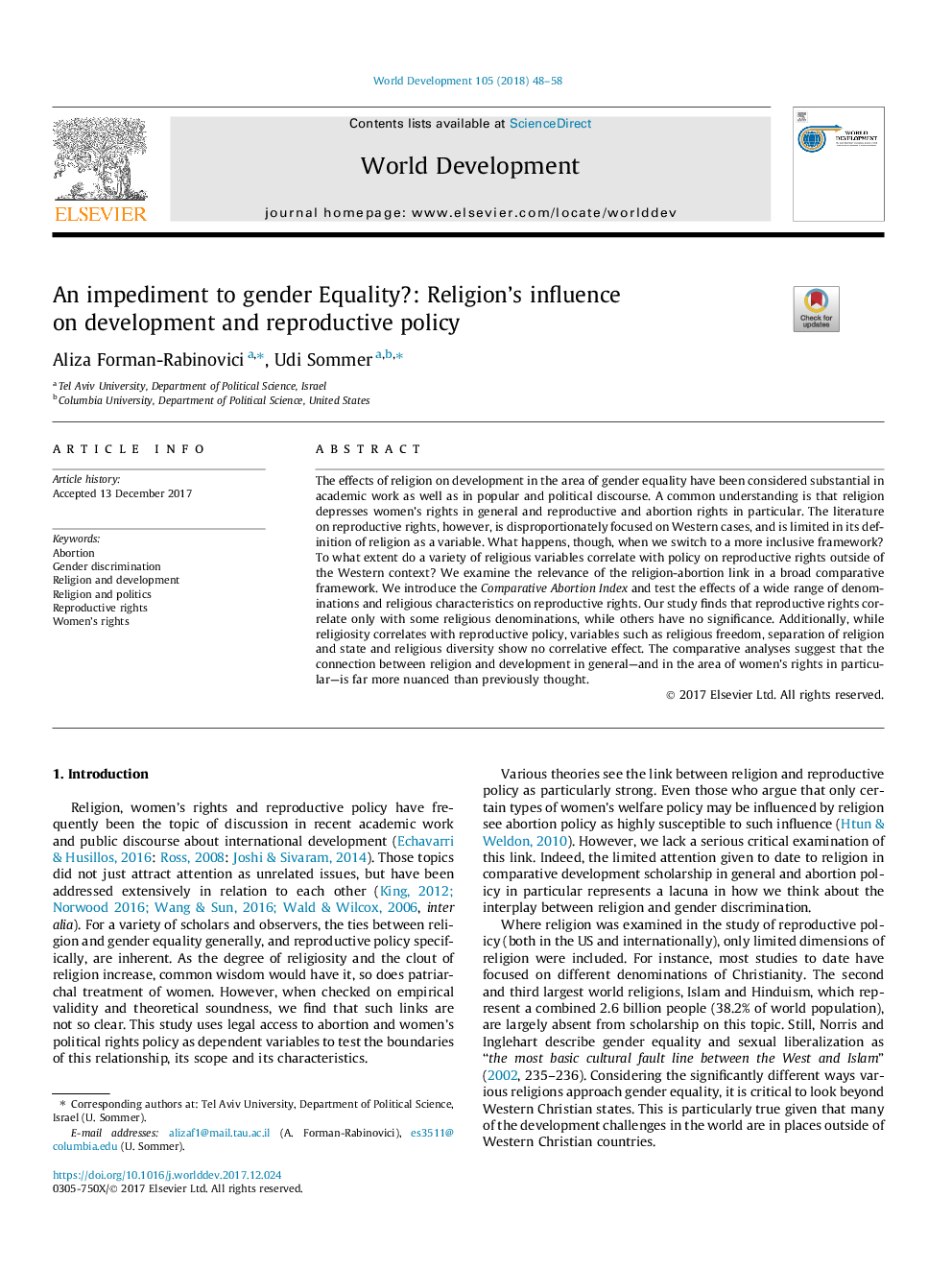| کد مقاله | کد نشریه | سال انتشار | مقاله انگلیسی | نسخه تمام متن |
|---|---|---|---|---|
| 7392072 | 1481113 | 2018 | 11 صفحه PDF | دانلود رایگان |
عنوان انگلیسی مقاله ISI
An impediment to gender Equality?: Religion's influence on development and reproductive policy
ترجمه فارسی عنوان
مانع از برابری جنسیتی؟ تأثیر ادیان در توسعه و سیاست تولید مثل
دانلود مقاله + سفارش ترجمه
دانلود مقاله ISI انگلیسی
رایگان برای ایرانیان
کلمات کلیدی
سقط جنین، تبعیض جنسیتی، دین و توسعه، دین و سیاست، حقوق تولید مثل، حقوق زنان،
ترجمه چکیده
تأثیرات دین بر توسعه در زمینه برابری جنسیتی در کارهای علمی و همچنین در گفتمان مردمی و سیاسی قابل توجه است. درک مشترک این است که دین افسردگی حقوق زنان به طور کلی و حقوق تولید مثل و سقط جنین را به طور خاص تحت تاثیر قرار می دهد. با این حال، ادبیات مربوط به حقوق باروری بر پرونده های غربی متمرکز است و محدودیت آن در تعریف دین به عنوان متغیر است. با این حال، چه اتفاقی می افتد، وقتی به یک چارچوب جامع تر تبدیل می شویم؟ به چه میزان متغیرهای مذهبی متنوعی با سیاست حقوق تولید مثل در خارج از بستر غربی ارتباط دارند؟ ما ارتباط پیوند مذهب سقط جنین را در چارچوب مقایسه ای گسترده بررسی می کنیم. ما شاخص سقط جنین تطبیقی را معرفی می کنیم و اثرات طیف وسیعی از فرهنگ ها و ویژگی های مذهبی را در مورد حقوق باروری بررسی می کنیم. مطالعه ما نشان می دهد که حقوق تولید مثل تنها با برخی از ادیان مذهبی ارتباط دارد، در حالی که دیگران اهمیتی ندارند. علاوه بر این، در حالی که دینداری با سیاست تولید مثل همبستگی دارد، متغیرهایی مانند آزادی مذهبی، جدایی دین و تنوعات مذهبی و مذهبی هیچ تاثیر متقابل ندارد. تجزیه و تحلیل تطبیقی نشان می دهد که ارتباط بین دین و توسعه به طور کلی - و در حوزه حقوق زنان به طور خاص - به مراتب بیشتر شبیه به گذشته است.
موضوعات مرتبط
علوم انسانی و اجتماعی
اقتصاد، اقتصادسنجی و امور مالی
اقتصاد و اقتصادسنجی
چکیده انگلیسی
The effects of religion on development in the area of gender equality have been considered substantial in academic work as well as in popular and political discourse. A common understanding is that religion depresses women's rights in general and reproductive and abortion rights in particular. The literature on reproductive rights, however, is disproportionately focused on Western cases, and is limited in its definition of religion as a variable. What happens, though, when we switch to a more inclusive framework? To what extent do a variety of religious variables correlate with policy on reproductive rights outside of the Western context? We examine the relevance of the religion-abortion link in a broad comparative framework. We introduce the Comparative Abortion Index and test the effects of a wide range of denominations and religious characteristics on reproductive rights. Our study finds that reproductive rights correlate only with some religious denominations, while others have no significance. Additionally, while religiosity correlates with reproductive policy, variables such as religious freedom, separation of religion and state and religious diversity show no correlative effect. The comparative analyses suggest that the connection between religion and development in general-and in the area of women's rights in particular-is far more nuanced than previously thought.
ناشر
Database: Elsevier - ScienceDirect (ساینس دایرکت)
Journal: World Development - Volume 105, May 2018, Pages 48-58
Journal: World Development - Volume 105, May 2018, Pages 48-58
نویسندگان
Aliza Forman-Rabinovici, Udi Sommer,
